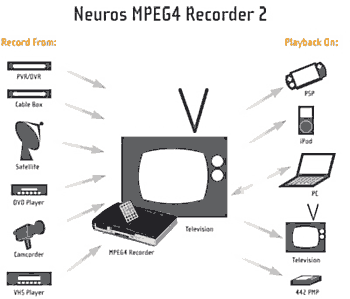
Image adapted from Neuros website
Via EFF DeepLinks, details of the Neuros MPEG4 Recorder 2, a product specifically designed to allow users to break through the arbitrary architectures of control imposed by other video devices and formats, and hence make the most of the content you own:
“[It] digitizes analog video output and records it to a CF card or a memory stick in MPEG4 format. The video can then be put on your computer, burned to DVD, moved to your video iPod, or slotted right into your Sony PSP. You can also output video to a display device from the R2.
In turn, the R2 helps you make legitimate use of your media and lawfully escape DRM restrictions…
* Free your recorded TV content: TiVo and other PVRs restrict moving recorded video to other devices. The DMCA limits removing these DRM locks, and, if the broadcast flag proposal passes, these restrictions will get even worse. Regardless, you can lawfully use the R2 to create a DRM-free copy, recording straight from your TV or TiVo.
* Free your DVDs: DVD ripping software is widely available, but using it to rip a film to your computer and video iPod may violate the DMCA. The R2 gives you a legal (albeit more cumbersome) alternative. Similarly, though region-free DVD players are available, you can use the R2 to help create a region-free copy of the movie itself.
* Free your VHS tapes: You’ve probably faced the unhappy choice between rebuying your VHS collection on DRM-restricted DVDs or lugging around a legacy player. The R2 helps you liberate your movies from their VHS chains.”
Of course, the R2 device’s legality – as a video analogue-to-digital converter – is threatened by proposed US legislation aimed at ‘plugging the analogue hole‘, hence its ‘endangered gizmo‘ status applied by the Electronic Frontier Foundation. This would seem to be a case where a device really has been designed with the users’ needs and convenience uppermost in mind, yet it may be ruled out of existence by a legislature which listens more to (certain) corporate lobbying than to its own citizens.